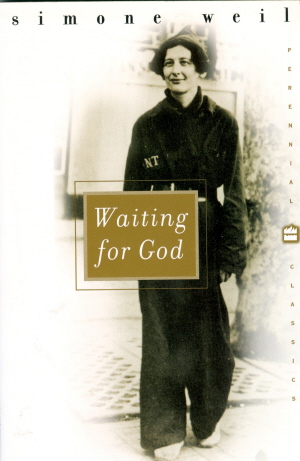 I Why The Classics
Bei Dao Zbigniew Herbert Zagajewski R. Carver Milosz Bolano Poems Charles Simic Brodsky Borges Cavafy_Ithaca Octavio Paz Thu 2013 NXH's Poems of the Night Lửa & Khoa Hữu & Celan TNH Poems Haiku_Buson Xmas 26 Dec 1999 Mark Strand Mahmoud Darwish W.S. Merwin TTT_9_Years Trang thơ Dã Viên The Lunatic by Simic Map by Szymborska Serbian Poetry ed by Simic Baczinski by AZ A Defense of Ardor by AZ |
Album | Thơ | Tưởng Niệm | Nội cỏ
của
thiên đường | Passage Eden | Sáng
tác | Sách mới xuất bản | Chuyện văn
Dịch thuật | Dịch ngắn | Đọc sách | Độc giả sáng tác | Giới thiệu | Góc Sài gòn | Góc Hà nội | Góc Thảo Trường Lý thuyết phê bình | Tác giả Việt | Tác giả ngoại | Tác giả & Tác phẩm | Text Scan | Tin văn vắn | Thời sự | Thư tín | Phỏng vấn | Phỏng vấn dởm | Phỏng vấn ngắn Giai thoại | Potin | Linh tinh | Thống kê | Viết ngắn | Tiểu thuyết | Lướt Tin Văn Cũ | Kỷ niệm | Thời Sự Hình | Gọi Người Đã Chết Ghi chú trong ngày | Thơ Mỗi Ngày | Chân Dung | Jennifer Video Nhật Ký Tin Văn/ Viết Thơ Mỗi Ngày 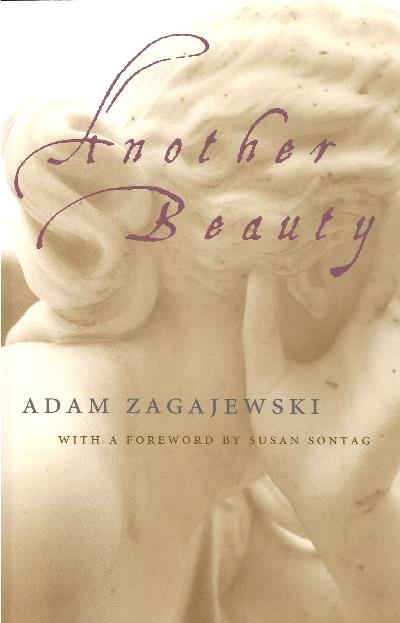 Gió
Hà Nội trong hồn người xa xứ Note: LMH có thể nói, là do
GCC khám phá ra, trong khi chính những kẻ ra đi từ Miền Bắc, thì lại dè
bỉu, “cái
Hà mà viết cái gì”, như 1 tay viết mail riêng cho GCC nhận xét, hay như
em Y Bọt
gì đó, 1 nhà văn trong nước được dịp ra hải ngoại, “viết thua cả học
trò của
tui”, hình như bà này đã từng phát biểu. Tuy nhiên, khi GCC nhận xét
LMH, hồi mới đọc bà, là từ 1 viễn ảnh của tương lai, của 1 miền đất,
cùng với nó
là thứ văn chương, như con phượng hoàng tái sinh từ tro than, như của
lũ Ngụy,
sau 1975, không phải thứ văn chương hoài niệm - như cách đọc LMH ở đây
- cũng
như cách mà đám VC đọc văn chương trước 1975 của Miền Nam, khi cho in
lại một số
tác phẩm của họ, bằng cách cắt xén, sao cho vừa cái nhìn kiểm duyệt của
chúng. NQT Khi đọc cái
tít, Phố Vẫn Gió, Gấu nghĩ, liệu nó trong dòng “Gió từ thời khuất mặt?” The
human face disappeared and also its divine image. In the classical
world a slave was called aprosopos, 'faceless'; litteraly, one who
cannot to be seen. The Bolsheviks gloried in facelessness. As
though, in night's terrible mirror **** .... All writing
is a species of remembering. If there is anything triumphalist about Another
Beauty it is that the acts of remembering the book contains
seem so
frictionless. Imagining-that is, bringing the past to mental life-is
there as
needed; it never falters; it is by definition a success. The recovery
of
memory, of course, is an ethical obligation: the obligation to persist
in the
effort to apprehend the truth. This seems less apparent in America,
where the
work of memory has been exuberantly identified with the creation of
useful or
therapeutic fictions, than in Zagajewski's lacerated corner of the
world. To
recover a memory-to secure a truth-is a supreme touch-stone of value in
Another
Beauty. "I didn't witness the extermination
of the Jews," he writes: That every
generation fears, misunderstands, and condescends to its
successor-this, too,
is a function of the equivalence of history and memory (history being
what it
is agreed on, collectively, to remember). Each generation has its
distinctive
memories, and the elapsing of time, which brings with it a steady
accumulation
of loss, confers on those memories a normativeness which cannot
possibly be
honored by the young, who are busy compiling their memories, their
benchmarks.
One of Zagajewski's most moving portraits of elders is of Stefan
Szuman, an
illustrious member of the interwar Polish intelligentsia (he had known
Stanislaw Witkiewicz and Bruno Schulz) and now a retired professor at
the
university living in isolation and penury. Its point is Zagajewski's
realization, thinking back, that he and his literary friends could only
have
seemed like fools and savages, "shaped by a postwar education, by new
schools, new papers, new radio, new TV;" to the defeated, homely,
embittered Szuman and his wife. The rule seems to be: each generation
looks
upon its successor generation as barbarians. Zagajewski, himself no
longer
young and now a teacher of American students, is committed to not
eplicating,
in his turn, that kind of despair and incomprehension. Nor is he
content to
write off an entire older Polish generation of intellectuals and
artists, his
generation's "enemy"-the true believers and those who just sold out-for
turpitude and cowardice: they weren't simply devils, any more than he
and his
friends were angels. As for those "who began by serving Stalin's
civilization" but then changed, Zagajewski writes: "I don't condemn
them for their early, youthful intoxication. I'm more inclined to
marvel at the
generosity of human nature, which offers gifted young people a second
chance,
the opportunity for a moral comeback." At the heart of this assessment
is
the wisdom of the novelist, a professional of empathy, rather than that
of a
lyric poet. (Zagajewski has written four novels, none as yet translated
into
English.) The dramatic monologue "Betrayal" in Two Cities begins: Why
did I do that? Why did I do what? Why was I who I was? And who was I? I am already beginning to regret that I agreed to grant you this interview. For years I refused; you must have asked me at a weak moment or in a moment of anxiety .... What did that world look like? The one you were too late to get to know. The same as this one. Completely different. That everything is always different ... and the same: a poet's wisdom. Actually, wisdom tout court. Of course, history should never be thought of with a capital H. The governing sense of Zagajewski's memory-work is his aware- ness of having lived through several historical periods, in the course of which things eventually got better. Modestly, imperfectly-not utopianly-better. The young Zagajewski and his comrades in dissidence had assumed that communism would last another hundred, two hundred years, when, in fact, it had less than two decades to go. Lesson: evil is not immutable. The reality is, everyone outlives an old self, often more than one, in the course of a reasonably long life. Susan Sontag: The Wisdom Project Tớ đếch chứng
kiến Lò Thiêu, làm cỏ Do Thái. Tớ sinh trễ quá. Tớ sinh ra và chứng
kiến tiến
trình qua đó Âu Châu tìm đường nhớ chính nó. Hồi nhớ Bắc
Kít, ngay từ bây giờ, đã vờ mấy cú: Quên mẹ cái “ơn trời biển” của
Thiên Triều Trong "Trò
Chuyện với Brodsky", của Volkov, chương chót, "St. Petersburg: Memories
of the
Future", Hồi Nhớ Tương Lai, đọc thú lắm, và áp dụng vô Hà Nội thật là
tuyệt. GCC đọc LMH,
để kiếm cái ấn bản của riêng Gấu, về nó. 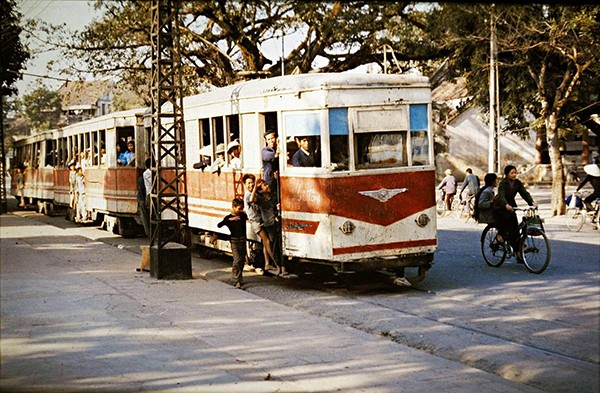 Người đàn ông làm tôi nhớ tới người Tầu già bán lạc rang ở bờ hồ Hà Nội. Tôi có nhiều kỷ niệm về thành phố nhỏ bé và cũ kỹ đó. Nhà tôi ở Bạch Mai, gần ngay bên đường xe điện. Tôi thường tinh nghịch để những viên sỏi nhỏ lên trên đường sắt, rồi hồi hộp chờ chuyến xe chạy qua. Suốt thời thơ ấu, tôi bị chiếc xe điện mê hoặc. Một lần trốn vé xe, tôi cùng một thằng bé đánh giầy ngồi ở cuối tầu, nơi dùng để nối hai toa xe lại với nhau. Thằng bé đánh giầy nói, nó thường ngồi như vậy, ngay cả khi có tiền mua vé. Hôm đó trời lạnh, tôi đội một chiếc béret dạ đen, một tay nắm vào thanh sắt, một tay cầm cặp sách vở. Thằng bé đánh giầy đầu tóc bù xù, tay cầm hộp đồ nghề, tay cầm khúc bánh mì nhai ngồm ngoàm. Những người đi đường nhìn chúng tôi với vẻ buồn cười, ngạc nhiên. Lúc đầu tôi rất sợ, nhưng dần dần cảm thấy thích thú. Bỗng nhiên, không hiểu sao, tôi nhớ lại được một đoạn nhạc tôi đã quên từ lâu, và tôi hát nho nhỏ, đầu lắc lư theo điệu nhạc. Thằng bé đánh giầy nhìn tôi cười ngặt nghẽo. Tôi tức giận, hát thật lớn, vừa hát vừa đập vào thành xe ầm ầm. Bỗng tôi cảm thấy đầu lành lạnh. Tôi ngửng lên, và thấy người soát vé đang giận dữ nhìn tôi, tay cầm chiếc mũ dạ. Thằng bé đánh giầy vẫn tiếp tục cười, tôi ngưng hát, và ngưng đập vào thành xe. Cuối cùng không biết nghĩ sao, người soát vé vứt chiếc dạ xuống đường. Xe lúc đó đang chạy nhanh. Tôi cúi nhìn xuống con đường nhựa chạy vùn vụt, tôi sợ hãi không dám nhảy xuống. Tôi chợt nghĩ tới đến cha tôi. Tôi nhìn thằng bé đánh giầy ra vẻ cầu cứu. Nó nhẩy xuống, nhặt chiếc mũ dạ, đội lên đầu, rồi nhìn tôi nhe răng cười, tỏ vẻ chế nhạo. Sau đó, tôi thỉnh thoảng gặp thằng bé đánh giầy quanh quẩn tại khu tôi ở, đầu đội chiếc mũ dạ của tôi. Mỗi lần thoáng thấy nó, là tôi vội vã lẩn tránh, chỉ sợ nó nhận ra tôi. Note: Hình dưới đây, "cũng" Phố Cổ Hà Nội!
 Gió
Hà Nội trong hồn người xa xứ Note: LMH có thể nói, là do
GCC khám phá ra, trong khi chính những kẻ ra đi từ Miền Bắc, thì lại dè
bỉu, “cái
Hà mà viết cái gì”, như 1 tay viết mail riêng cho GCC nhận xét, hay như
em Y Bọt
gì đó, 1 nhà văn trong nước được dịp ra hải ngoại, “viết thua cả học
trò của
tui”, hình như bà này đã từng phát biểu. Tuy nhiên, khi GCC nhận xét
LMH, hồi mới đọc bà, là từ 1 viễn ảnh của tương lai, của 1 miền đất,
cùng với nó
là thứ văn chương, như con phượng hoàng tái sinh từ tro than, như của
lũ Ngụy,
sau 1975, không phải thứ văn chương hoài niệm - như cách đọc LMH ở đây
- cũng
như cách mà đám VC đọc văn chương trước 1975 của Miền Nam, khi cho in
lại một số
tác phẩm của họ, bằng cách cắt xén, sao cho vừa cái nhìn kiểm duyệt của
chúng. NQT Khi đọc cái
tít, Phố Vẫn Gió, Gấu nghĩ, liệu nó trong dòng “Gió từ thời khuất mặt?” The
human face disappeared and also its divine image. In the classical
world a slave was called aprosopos, 'faceless'; litteraly, one who
cannot to be seen. The Bolsheviks gloried in facelessness. **** .... All writing
is a species of remembering. If there is anything triumphalist about Another
Beauty it is that the acts of remembering the book contains
seem so
frictionless. Imagining-that is, bringing the past to mental life-is
there as
needed; it never falters; it is by definition a success. The recovery
of
memory, of course, is an ethical obligation: the obligation to persist
in the
effort to apprehend the truth. This seems less apparent in America,
where the
work of memory has been exuberantly identified with the creation of
useful or
therapeutic fictions, than in Zagajewski's lacerated corner of the
world. To
recover a memory-to secure a truth-is a supreme touch-stone of value in
Another
Beauty. "I didn't witness the extermination
of the Jews," he writes: That every
generation fears, misunderstands, and condescends to its
successor-this, too,
is a function of the equivalence of history and memory (history being
what it
is agreed on, collectively, to remember). Each generation has its
distinctive
memories, and the elapsing of time, which brings with it a steady
accumulation
of loss, confers on those memories a normativeness which cannot
possibly be
honored by the young, who are busy compiling their memories, their
benchmarks.
One of Zagajewski's most moving portraits of elders is of Stefan
Szuman, an
illustrious member of the interwar Polish intelligentsia (he had known
Stanislaw Witkiewicz and Bruno Schulz) and now a retired professor at
the
university living in isolation and penury. Its point is Zagajewski's
realization, thinking back, that he and his literary friends could only
have
seemed like fools and savages, "shaped by a postwar education, by new
schools, new papers, new radio, new TV;" to the defeated, homely,
embittered Szuman and his wife. The rule seems to be: each generation
looks
upon its successor generation as barbarians. Zagajewski, himself no
longer
young and now a teacher of American students, is committed to not
eplicating,
in his turn, that kind of despair and incomprehension. Nor is he
content to
write off an entire older Polish generation of intellectuals and
artists, his
generation's "enemy"-the true believers and those who just sold out-for
turpitude and cowardice: they weren't simply devils, any more than he
and his
friends were angels. As for those "who began by serving Stalin's
civilization" but then changed, Zagajewski writes: "I don't condemn
them for their early, youthful intoxication. I'm more inclined to
marvel at the
generosity of human nature, which offers gifted young people a second
chance,
the opportunity for a moral comeback." At the heart of this assessment
is
the wisdom of the novelist, a professional of empathy, rather than that
of a
lyric poet. (Zagajewski has written four novels, none as yet translated
into
English.) The dramatic monologue "Betrayal" in Two Cities begins: Why
did I do that? Why did I do what? Why was I who I was? And who was I? I am already beginning to regret that I agreed to grant you this interview. For years I refused; you must have asked me at a weak moment or in a moment of anxiety .... What did that world look like? The one you were too late to get to know. The same as this one. Completely different. That everything is always different ... and the same: a poet's wisdom. Actually, wisdom tout court. Of course, history should never be thought of with a capital H. The governing sense of Zagajewski's memory-work is his aware- ness of having lived through several historical periods, in the course of which things eventually got better. Modestly, imperfectly-not utopianly-better. The young Zagajewski and his comrades in dissidence had assumed that communism would last another hundred, two hundred years, when, in fact, it had less than two decades to go. Lesson: evil is not immutable. The reality is, everyone outlives an old self, often more than one, in the course of a reasonably long life. Susan Sontag: The Wisdom Project Tớ đếch chứng
kiến Lò Thiêu, làm cỏ Do Thái. Tớ sinh trễ quá. Tớ sinh ra và chứng
kiến tiến
trình qua đó Âu Châu tìm đường nhớ chính nó. Hồi nhớ Bắc
Kít, ngay từ bây giờ, đã vờ mấy cú: Quên mẹ cái “ơn trời biển” của
Thiên Triều SONG ABOUT
SONGS It will burn
you at the start, And a heart
full of spite Others will
reap. I only sow.
1916 Akhmatova Writing when I mount
a chair in the
table's wilderness for a little
while longer FURNISHED ROOM In this room
there are three suitcases when I open
the door one picture
on the wall I never saw
Vesuvius the other
picture out of the
shadow on the table
a knife a napkin following a
golden light the leaves
breathe in the light an untrue
world flaking
wallpaper In my room Zbigniew
Herbert: The Collected Poems
1956-1998 NINA
ZIVANCEVC Zivancevic was born in Belgrade. She is a literary critic, journalist, and translator as well as a poet. She lived for several years in New York, where she wrote in English, and now resides in Paris. New Rivers Press published a book of her poems, More or Less Urgent, in 1980. The poems in this anthology come from her books The Spirit of Renaissance (1989) and At the End of the Century (2006). Ode to Western Wind
O, great
great Western wind, Charles
Simic: The Horse Has Six Legs, an
anthology of Serbian Poetry.
The one they
roll out in a wheelchair While
pigeons take turns landing Charles
Simic LRB [London
Review of Books] May 9 2013 Trong thời gian ngọt
ngào của riêng nó Cái lá còn lại,
lâu lâu khẽ run 1 phát Thằng chả ngồi
xe lăn Khi bồ câu xếp
hàng
ON THE
BROOKLYN BRIDGE Perhaps
you're one of the many dots at sunset The one,
whose family doesn't want to hear from, And what
about the one I'm always hoping to run into? Trên cầu Brooklyn
Bridge Có lẽ em là
một cái chấm nhỏ trong rất nhiều chấm chấm vào lúc mặt trời lặn Hay là một cái
chấm mà gia đình không thèm muốn nghe nói tới Tuy nhiên chán làm sao anh không làm sao nhớ ra nổi khuôn mặt em Ở tiệm cà phê Starbucks buổi sáng bữa đó Em có thể là một trong vài người lần lữa, Hay cái người mà đã biến mất từ MCNK [một chủ nhật khác] không hề có? Cái người mà anh lần cuối nhìn lại Như nhìn lại Xề Gòn Đã mất? Neither the
intimacy of your look, your brow fair as
[Robert Fitzgerald] J.L. Borges: Selected Poems
1923-1967 Đường vào tình
yêu Không phải mùi cơ thể của em, tuy vưỡn bí hiểm, vưỡn dành riêng cho anh, và vưỡn muôn đời trẻ thơ Không phải điều đến với anh, từ em, bằng lời, hay bằng im lặng Sẽ cực kỳ bí ẩn, như một món quà Khi nhìn thấy em ngủ, Cuộn tròn, thánh thiện, như thiên thần, như thánh nữ trong tay anh Thánh nữ, again, như lời kinh, bằng cái quyền uy thấm nhập của giấc ngủ lặng lẽ, long lanh, như một điều “gọi là” hạnh phúc, được tìm thấy lại, từ hồi nhớ Em sẽ cho anh bến bờ đó của đời em, mà em, chính em, không sở hữu. Nhập vào im lặng Anh sẽ nhận ra bãi biển tối hậu của sự hiện hữu là em Và sẽ nhìn thấy em lần đầu, có lẽ, Như Ông Giời phải, bắt buộc phải, chiêm ngưỡng em, như thế - Giả tưởng của Thời Gian bị hủy diệt Vô tư thoát ra khỏi tình yêu Thoát ra khỏi anh. Poem in the
Manner of William Wordsworth By David
Lehman I ran with
the wind like a boy And thus was
born my theory of joy If such a
thought were vain, Not even—my
sister, my life—not in body
bruised but with dignity high, Bài thơ ăn theo William Wordsworth Tôi chạy cùng
với gió như một đứa bé Và như thế bèn
sinh ra lý thuyết của tôi về vui Giả như một
tư tưởng như thế chỉ là vô ích, nhảm nhí đối với tôi Ngay cả - chị
tôi, đời tôi - Trong cái thân
xác bầm tím nhưng với phẩm giá cao
Charity The
off-white hairpiece on the hedge The snowman
prisoner down the road His head
fell off last night and we Lòng từ thiện Mớ tóc giả màu
ngà ở bờ rào Người tù tuyết
nhân ở cuối đường Cái đầu rớt
ra tối hôm qua ALISTAIR
ELLIOT TLS June 5 2015 Anticipation
of Love Neither the
intimacy of your look, your brow fair as a feast day,
-R.F. 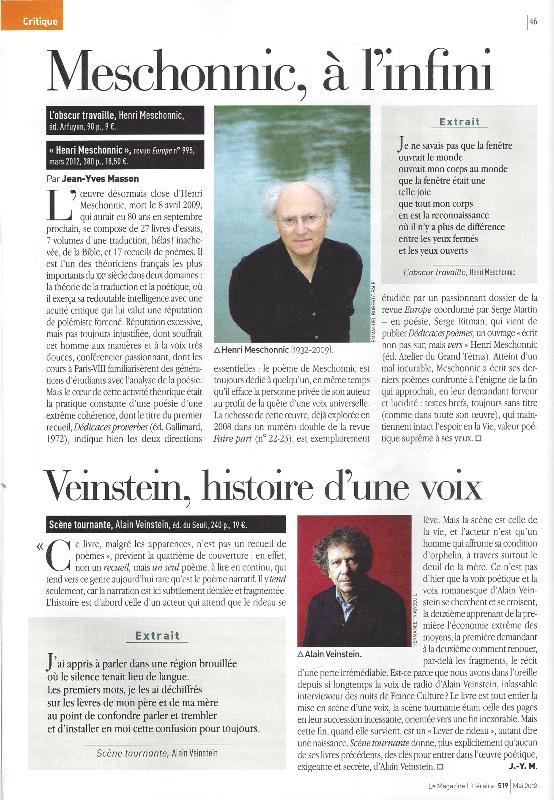 Extrait J'ai appris à parler dans
une région brouillée Gấu học nói trong 1 vùng
lù tà mù Hà, hà!
You are my silent
brethren, In old letters I find
traces of your writing, Your addresses and phone
numbers pitch camp I was in Paris yesterday,
I saw hundreds of tourists, You'd think it would be
easy, living. You are my masters, Adam Zagajewski: Mysticism for Beginners Đồng bào
Các bạn là đồng bào im lặng của tớ Trong những lá thư cũ tớ kiếm
thấy những nét chữ của các bạn, Địa chỉ và số phôn của các bạn
thì cắm trại Bữa hôm qua, tớ ở Paris, và tớ thấy hàng trăm
du khách, mệt mỏi, rét run. Các bạn nghĩ, sống thì cũng dễ dàng thôi Những người chết Đừng quên tớ. 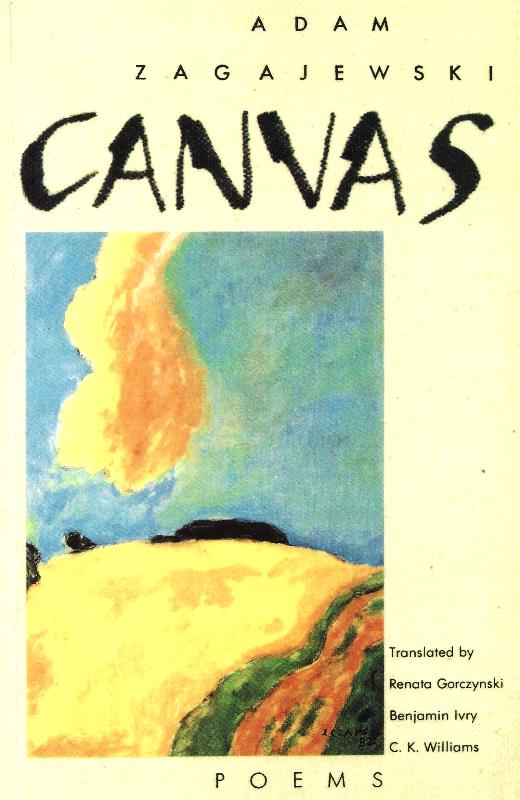 Canvas I stood in
silence before a dark picture, I stood in
silence before the dark canvas, of moments
of helplessness striking
what it loves, Canvas Tôi đứng im
lặng trước bức hình tối thui Tôi đứng in
lặng trước tấm vải bố tối thui Tới những
khoảnh khắc vô vọng Thoi, cái yêu For Czeslaw
Milosz How
unattainable life is, it only reveals Adam
Zagajewski: Canvas Trái Làm sao mà
tó được cuộc đời THE GREAT
POET HAS GONE Of course
nothing changes When the
great poet has gone,
Nhà thơ lớn
đã ra đi Lẽ dĩ nhiên
chẳng có gì thay đổi Khi nhà thơ
lớn ra đi Tới trưa, vẫn
thứ tiếng ồn đó nổi lên, Khi chúng ta
bỏ đi, một chuyến đi dài Le poète
intraitable Il ne peut
toutefois adhérer au marxisme: la lecture de Simone Weil (qu'il traduit
en
polonais) a joué à cet égard un rôle capital dans son évolution
intellectuelle.
Elle aura été la première à dévoiler la contradiction dans les termes
que
représente le « matérialisme dialectique ». Pour une pensée
intégralement
matérialiste (comme celle d'Engels), l'histoire est le produit de
forces
entièrement étrangères à l'individu, et l'avènement de la société
communiste, une
conséquence logique de l'histoire; la liberté n'y a aucune place. En y
introduisant la « dialectique ", Marx réaffirme que l'action des
individus
est malgré tout nécessaire pour qu'advienne la société idéale: mais
cette
notion amène avec elle l'idéalisme hégélien et contredit à elle seule
le
matélialisme. C'est cette contradiction qui va conduire les sociétés «
socialistes" à tenir l'individu pour quantité négligeable tout en
exigeant
de lui qu'il adhère au sens supposé inéluctable de l'histoire. Mais la
philosophie de Simone Weil apporte plus encore à Milosz que cette
critique:
elle lui livre les clés d'une anthropologie chrétienne qui, prolongeant
Pascal,
décrit l'homme comme écartelé entre la « pesanteur" et la « grâce ". Nhà thơ
không làm sao “xử lý” được. Tuy nhiên,
ông không thể vô Mác Xít: Việc ông đọc Simone Weil [mà ông dịch qua
tiếng Ba
Lan] đã đóng 1 vai trò chủ yếu trong sự tiến hóa trí thức của ông. Bà
là người
đầu tiên vén màn cho thấy sự mâu thuẫn trong những thuật ngữ mà chủ
nghĩa duy vật
biện chứng đề ra. Ðối với một tư tưởng toàn-duy vật [như của Engels],
lịch sử
là sản phẩm của những sức mạnh hoàn toàn xa lạ với 1 cá nhân con người,
và cùng
với sự lên ngôi của xã hội Cộng Sản, một hậu quả hữu lý của lịch sử; tự
do chẳng
hề có chỗ ở trong đó. Khi đưa ra cái từ “biện chứng”, Marx tái khẳng
định hành
động của những cá nhân dù bất cứ thế nào thì đều cần thiết để đi đến xã
hội lý
tưởng: nhưng quan niệm này kéo theo cùng với nó, chủ nghĩa lý tưởng của
Hegel,
và chỉ nội nó đã chửi bố chủ nghĩa duy vật. Chính mâu thuẫn này dẫn tới
sự kiện,
những xã hội “xã hội chủ nghĩa” coi cá nhân như là thành phần chẳng
đáng kể, bọt
bèo của lịch sử, [như thực tế cho thấy], trong khi đòi hỏi ở cá nhân,
phải tất
yếu bọt bèo như thế. Nhưng triết học của Simone Weil đem đến cho Milosz
quá cả
nền phê bình đó: Bà đem đến cho ông những chiếc chìa khoá của một nhân
bản học
Ky Tô, mà, kéo dài Pascal, diễn tả con người như bị chia xé giữa “trọng
lực” và
“ân sủng”. Chúng ta phải
coi cái đẹp như là trung gian giữa cái cần và cái tốt (mediation
between
necessity and the good), giữa trầm trọng và ân sủng (gravity and
grace). Milosz
cố triển khai tư tưởng này [của Weil], trong
tác phẩm “Sự Nắm Bắt Quyền Lực”, tiếp theo
“Cầm Tưởng”. Đây là một
cuốn tiểu thuyết viết hối hả, với ý định cho tham dự một cuộc thi văn
chương,
nghĩa là vì tiền, và cuối cùng đã đoạt giải! Viết hối hả, vậy mà chiếm
giải,
nhưng thật khó mà coi đây là một tuyệt phẩm. Ngay chính tác giả cũng vờ
nó đi,
khi viết Lịch Sử Văn Học Ba Lan. Tuy nhiên, đây là câu chuyện của thế
kỷ. Nhân
vật chính của cuốn tiểu thuyết tìm cách vượt biên giới Nga, để sống
dưới chế độ
Nazi, như Milosz đã từng làm như vậy. THE
IMPORTANCE OF SIMONE WElL FRANCE
offered a rare gift to the contemporary world in the person of Simone
Weil. The
appearance of such a writer in the twentieth century was against all
the rules of
probability, yet improbable things do happen. The life of
Simone Weil was short. Born in 1909 in Paris, she died in England in
1943 at
the age of thirty-four. None of her books appeared during her own
lifetime.
Since the end of the war her scattered articles and her
manuscripts-diaries,
essays-have been published and translated into many languages. Her work
has
found admirers all over the world, yet because of its austerity it
attracts
only a limited number of readers in every country. I hope my
presentation will
be useful to those who have never heard of her. [suite] Czeslaw
Milosz 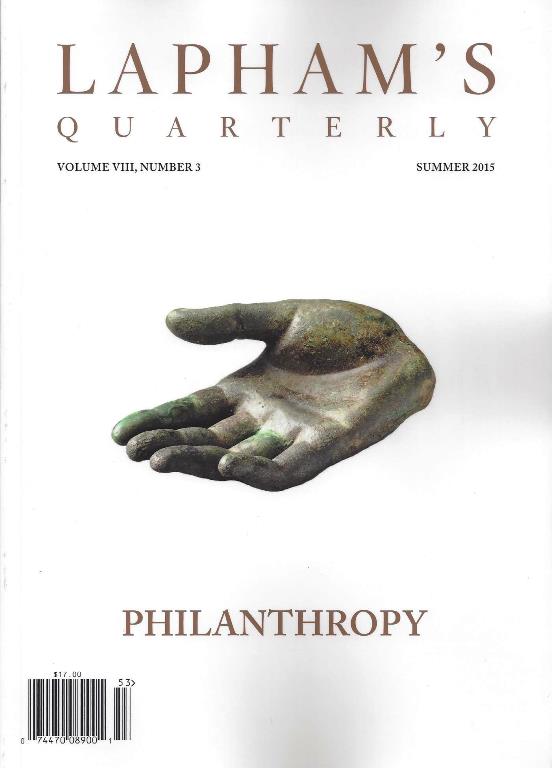 Trong số báo
về Lòng Từ Thiện, có bài của Simone Weil, trích từ The Need for Roots. Trong tiểu
sử của bà, có trích dẫn một câu, của Susan Sontag, viết về Weil: [From The
Need for Roots]. Born in Paris in 1909, Weil dedicated her lift to
advocating
for the poor and disenfranchised. She worked as a teacher, trained with
an
anarchist unit during the Spanish Civil War, and once debated Leon
Trotsky in
her parents' apartment after arranging for him to hold a clandestine
meeting
there. Weil's uncompromising asceticism led Susan Sontag to declare,
"No
one who loves life would wish to imitate her dedication to martyrdom."
The
bulk of Weil's writing was published only after her death from
tuberculosis in
1943. Gấu không nghĩ là cái tay “viết lại” Kẻ Xa Lạ và được Goncourt năm nay, hiểu được Camus. Tư tưởng của Camus, là từ Weil mà ra, (b) và Weil, như Susan Sontag, viết ở trên, cho rằng, chẳng ai dám bắt chước Weil, nếu kẻ đó còn yêu cuộc đời này! Bất giác lại nhớ tới lời
phẩm bình của vị thân hữu của TV. Vị này giải
thích,
Camus đẹp trai quá, “gái” nhiều quá, làm sao bắt chước cái khổ hạnh ghê
gớm như
của Weil! Có 1 cái gì
cực kỳ ngược ngạo, và hình như lại bổ túc cho nhau, giữa câu của Weil,
khi nhìn
những đoàn quân Nazi tiến vào Paris, và của TTT, khi nhìn VC Bắc Kít vô
Saigon. (b) Violent in
her judgments and uncompromising, Simone Weil was, at least by
temperament, an
Albigensian, a Cathar; this is the key to her thought. She drew extreme
conclusions from the Platonic current in Christianity. Here we touch perhaps
upon hidden ties between her and Albert Camus. The first work
by Camus was his
university dissertation on Saint Augustine. Camus, in my opinion, was
also a
Cathar, a pure one, and if he rejected God it was out of love for God
because
he was not able to justify Him. The last novel written by Camus, The
Fall, is
nothing else but a treatise on Grace-absent grace-though it is also a
satire:
the talkative hero, Jean-Baptiste Clamence, who reverses the words of
Jesus and
instead of "Judge not and ye shall not be judged" gives the advice
"Judge, and ye shall not be judged," could be, I have reasons to
suspect, Jean-Paul Sartre. 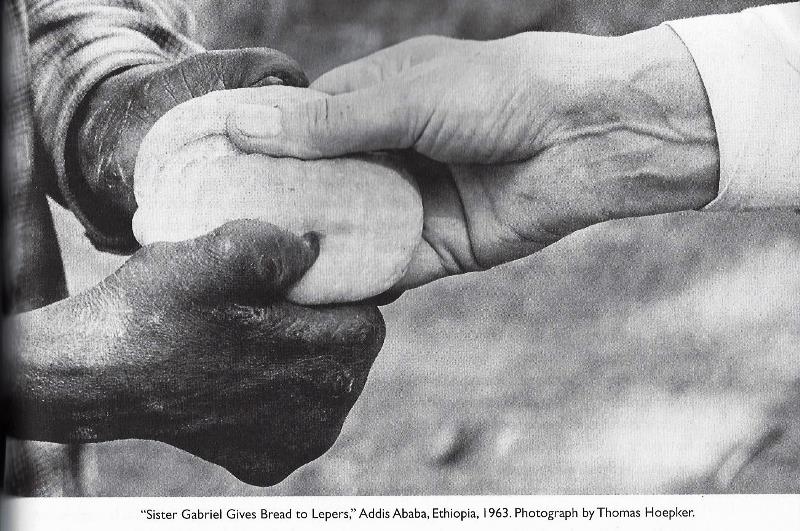 Susan Sontag Note: Bài viết
cách đây 50 năm, nhân kỷ niệm 50 năm NYRB, bèn cho đăng lại. Susan
Sontag không
đọc được Simone Weil. Cách nhìn của bà thua cả Gấu, đó là sự thực. Steiner,
Milosz, đọc Simone Weil, "đốn ngộ" hơn nhiều. Trên TV đã dịch bài của
Steiner. Gấu sẽ đi tiếp bài của Milosz, "Sự quan
trọng
của Simone Weil", in trong “To Begin Where I Am”. Trong cuốn này, có
mấy
bài thật là tuyệt. Bài essay, sau đây, chỉ cái tít không thôi, đã chửi
bố mấy đấng
VC đứng về phe nước mắt: Sontag chỉ
chịu nổi cuốn sau đây của Simone Weil:
The
principal value of the collection is simply that anything from Simone
Weil’s
pen is worth reading. It is perhaps not the book to start one’s
acquaintance
with this writer—Waiting for God, I
think, is the best for that. The originality of her psychological
insight, the
passion and subtlety of her theological imagination, the fecundity of
her
exegetical talents are unevenly displayed here. Yet the person of
Simone Weil
is here as surely as in any of her other books—the person who is
excruciatingly
identical with her ideas, the person who is rightly regarded as one of
the most
uncompromising and troubling witnesses to the modern travail of the
spirit. Co ai "noi nang" chi may bai cua Weil khg vay? Khg biet co ai kien nhan doc? Phúc đáp: Cần gì ai đọc! Tks. Take care. NQT * Bac viet phach loi nhu the nay - ky qua... * Thi phai phach loi nhu vay, gia roi. * Gia roi phai hien ma chet! Đa tạ. Nhưng, phách lối, còn thua xa thầy S: Ta là bọ chét! Phỏng Vấn Steiner Tuy cũng thuộc
băng đảng thực dân [mới, so với cũ, là Tẩy], nhưng
quả là Sontag không đọc ra, chỉ ý này, của
Steiner, trong Bad Friday: Với Weil, những
“tội ác” của chủ nghĩa thực dân có hồi đáp liền tù tì theo kiểu đối
xứng, cả về
tôn giáo và chính trị, với sự thoái hóa ở nơi quê nhà, tức “mẫu quốc”. Nhưng Bắc Kít,
giả như có đọc Weil, thì cũng thua thôi, ngay cả ở những đấng cực tinh
anh, là
vì nửa bộ óc của chúng bị liệt, đây là sự thực hiển nhiên, đừng nghĩ là
Gấu cường
điệu. Chúng làm sao nghĩ chúng cũng chỉ 1 thứ thực dân, khi ăn cướp
Miền Nam, vì
chúng biểu là nhà của chúng, vì cũng vẫn nước Mít, tại làm sao mà nói
là chúng ông
ăn cướp được. Chúng còn nhơ
bẩn hơn cả tụi Tẩy mũi lõ, tụi Yankee mũi lõ. Steiner còn
bài “Thánh Simone-Simone Weil”, trên TV cũng đã giới thiệu. For Weil, the "crimes" of colonialism related immediately, in both religious and political symmetry, to the degradation of the homeland. Time and again, a Weil aphorism, a marginalium to a classical or scriptural passage, cuts to the heart of a dilemma too often masked by cant or taboo. She did not flinch from contradiction, from the insoluble. She believed that contradiction "experienced right to the depths of one's being means spiritual laceration, it means the Cross." Without which "cruciality" theological debates and philosophic postulates are academic gossip. To take seriously, existentially, the question of the significance of human life and death on a bestialized, wasted planet, to inquire into the worth or futility of political action and social design is not merely to risk personal health or the solace of common love: it is to endanger reason itself. The two individuals who have in our time not only taught or written or generated conceptually philosophic summonses of the very first rank but lived them, in pain, in self-punishment, in rejection of their Judaism, are Ludwig Wittgenstein and Simone Weil. At how very many points they walked in the same lit shadows. Đối với Simone Weil, những “tội ác” của chủ nghĩa thực dân thì liền lập tức mắc míu tới băng hoại, thoái hóa, cả về mặt tôn giáo lẫn chính trị ở nơi quê nhà. Nhiều lần, một Weil lập ngôn – những lập ngôn này dù được trích ra từ văn chương cổ điển hay kinh thánh, thì đều như mũi dao - cắt tới tim vấn nạn, thứ thường xuyên che đậy bằng đạo đức giả, cấm kỵ. Bà không chùn bước trước mâu thuẫn, điều không sao giải quyết. Bà tin rằng, mâu thuẫn là ‘kinh nghiệm những khoảng sâu thăm thẳm của kiếp người, và, kiếp người là một cõi xé lòng, và, đây là Thập Giá”. Nếu không ‘rốt ráo’ đến như thế, thì, những cuộc thảo luận thần học, những định đề triết học chỉ là ba trò tầm phào giữa đám khoa bảng. Nghiêm túc mà nói, sống chết mà bàn, câu hỏi về ý nghĩa đời người và cái chết trên hành tinh thú vật hóa, huỷ hoại hoá, đòi hỏi về đáng hay không đáng, một hành động chính trị hay một phác thảo xã hội, những tra vấn đòi hỏi như vậy không chỉ gây rủi ro cho sức khoẻ cá nhân, cho sự khuây khoả của một tình yêu chung, mà nó còn gây họa cho chính cái gọi là lý lẽ.Chỉ có hai người trong thời đại chúng ta, hai người này không chỉ nói, viết, hay đề ra những thảo luận triết học mang tính khái niệm ở đẳng cấp số 1, nhưng đều sống chúng, trong đau đớn, tự trừng phạt chính họ, trong sự từ bỏ niềm tin Do Thái giáo của họ, đó là Ludwig Wittgenstein và Simone Weil. Đó là vì sao, ở rất nhiều điểm, họ cùng bước trong những khoảng tối tù mù như nhau. |

